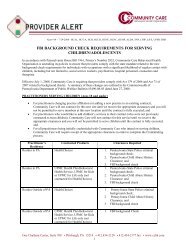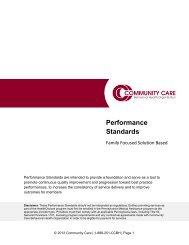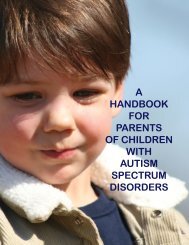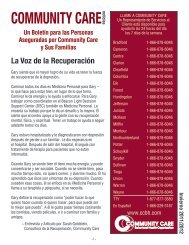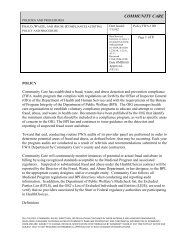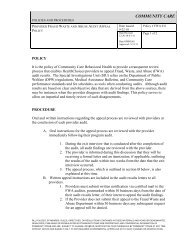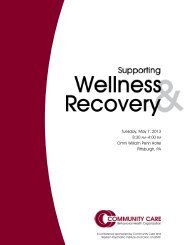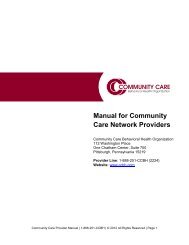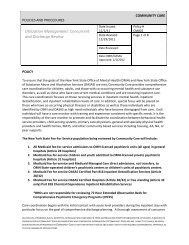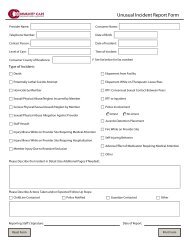Questions and Answers about Autism Spectrum Disorder Services
Questions and Answers about Autism Spectrum Disorder Services
Questions and Answers about Autism Spectrum Disorder Services
- No tags were found...
Create successful ePaper yourself
Turn your PDF publications into a flip-book with our unique Google optimized e-Paper software.
Whom can I call for information <strong>and</strong><br />
assistance<br />
What should I do if I am not happy <strong>about</strong><br />
the services my child is receiving<br />
Whom can I talk to <strong>about</strong> my concerns<br />
What is TSS Can I get TSS if my child<br />
needs behavioral support in school<br />
How can I get a copy of the Community<br />
Care H<strong>and</strong>book for Parents of Children<br />
with <strong>Autism</strong> <strong>Spectrum</strong> <strong>Disorder</strong>s<br />
Who are the BHRS evaluators <strong>and</strong><br />
prescribers in Allegheny County<br />
A&<br />
<strong>Questions</strong> <strong>and</strong> <strong>Answers</strong> <strong>about</strong> <strong>Autism</strong> <strong>Spectrum</strong> <strong>Disorder</strong> <strong>Services</strong>
A recent census report published regarding the prevalence of autism in Pennsylvania speaks to the<br />
explosive growth in the number of individuals affected by autism spectrum disorders (ASD). According<br />
to this report, Allegheny County has the highest prevalence rate in Pennsylvania with a projected<br />
2,220 residents diagnosed with ASD. Since most individuals with ASD are eligible for Medical<br />
Assistance, many children <strong>and</strong> adolescents receive behavioral health services through the mental<br />
health treatment providers enrolled in the Medical Assistance program. Many services are paid for by<br />
the County’s HealthChoices program through Community Care, the local behavioral health managed<br />
care organization.<br />
Community Care has also noted the rapid growth of children <strong>and</strong> adolescents with ASD receiving<br />
behavioral health services through the HealthChoices Program. For example, in 2002, there were<br />
881 children <strong>and</strong> adolescents with ASD who received Behavioral Health Rehabilitation <strong>Services</strong><br />
(BHRS), a service often referred to as a “wraparound” service that provides Behavioral Specialist<br />
Consultant (BSC), Mobile Therapy (MT), <strong>and</strong> Therapeutic Staff Support (TSS) to children in their<br />
home <strong>and</strong> community. By the end of 2008, over 1,900 children <strong>and</strong> adolescents with ASD received<br />
BHRS in Allegheny County, <strong>and</strong> this growth trend continued in 2009. To address the growing need for<br />
ASD services, Community Care is seeking to exp<strong>and</strong> the capacity of our provider network through a<br />
Request for Qualifications process. We will convene a group of stakeholders to include advocates,<br />
family members, <strong>and</strong> youth to assist us in evaluating the proposals.<br />
In January 2010, Community Care, the Allegheny County Office of Behavioral Health <strong>and</strong> the Office<br />
of Mental Health <strong>and</strong> Substance Abuse <strong>Services</strong> held two meetings to gather information directly<br />
from families <strong>about</strong> the challenges they are facing when attempting to access services or while<br />
receiving BHRS. While several parents had positive experiences to report, a number of parents<br />
reported challenges regarding timely access to services <strong>and</strong> disruptions in service delivery due to<br />
inconsistencies in workforce availability. Since this group of 25 families represents a small portion<br />
of families receiving services in Allegheny County, we are committed to continuing the fact-finding<br />
process with other families of children/adolescents receiving BHRS. One way we hope to get the<br />
input of additional families receiving services is through quarterly Family Advisory Committee meetings.<br />
Community Care is taking a number of additional steps to gather information <strong>and</strong> address the<br />
challenges identified by families including:<br />
• Publishing this newsletter, which provides important information to families <strong>about</strong> BHRS <strong>and</strong><br />
what families can do if they have questions <strong>about</strong> services for their child with ASD <strong>and</strong>/or are not<br />
satisfied with the services their child is receiving.<br />
• Performing surveys of BHRS providers to gather facts regarding capacity to serve new referrals of<br />
children with ASD.<br />
• Making telephone calls to families of children receiving BHRS to ask important questions <strong>about</strong><br />
the services <strong>and</strong> to let families know that they can call Community Care at any time if they have<br />
questions or concerns <strong>about</strong> services.<br />
• Asking providers to notify Community Care immediately if they are unable to accept a new referral<br />
or if existing services may be disrupted because of staffing issues.<br />
We hope that you find the information contained in this newsletter to be informative <strong>and</strong> helpful. We<br />
are very interested in your feedback <strong>about</strong> this newsletter <strong>and</strong> how we can work together to make<br />
sure children <strong>and</strong> adolescents with ASD get the highest quality services.
-4-<br />
Whom can I call for information <strong>and</strong> assistance<br />
Community Care has established a toll-free<br />
phone line specifically for parents <strong>and</strong> guardians<br />
of HealthChoices members who have been<br />
diagnosed with an autism spectrum disorder.<br />
Please call the Community Care <strong>Autism</strong> Support<br />
Line if you need information <strong>about</strong> autism<br />
services <strong>and</strong> treatment options or to express a<br />
concern related to services.<br />
The <strong>Autism</strong> Support Line is answered by a<br />
Customer <strong>Services</strong> Representative during regular<br />
business hours (Monday through Friday, 8 a.m.<br />
to 5 p.m.). If you call after hours, you can leave<br />
a message; a Care Manager will return your call<br />
the next business day.<br />
CALL THE COMMUNITY CARE AUTISM<br />
SUPPORT LINE, (TOLL-FREE) 1-866-415-1708.<br />
WE ARE HERE TO ASSIST YOU.<br />
What should I do if I am not happy <strong>about</strong> the<br />
services my child is receiving<br />
If you are not happy with the treatment services<br />
that your child is receiving, the first thing you<br />
should do is call Community Care. A Care<br />
Manager will listen to your concerns <strong>and</strong> assist<br />
you in getting the care your child needs.<br />
A Care Manager can work with your provider to<br />
make sure that your concerns are addressed or<br />
can work with you to find a new provider.<br />
We have set very high st<strong>and</strong>ards for the<br />
providers in our network <strong>and</strong> hold them<br />
accountable for their services. The performance<br />
st<strong>and</strong>ards for our BHRS providers can be<br />
found on our website at http://www.ccbh.<br />
com/pdfs/Providers/performanceSt<strong>and</strong>ards/<br />
BHRSfor<strong>Autism</strong><strong>Spectrum</strong><strong>Disorder</strong>s.pdf.<br />
If you are not satisfied in any way, we want to<br />
hear from you. By expressing your concerns,<br />
you are providing us with the information we<br />
need for the continuous improvement of the<br />
quality of services for our members. Call us; your<br />
satisfaction is our priority.<br />
What is a complaint<br />
A complaint is what you file if you are unhappy with<br />
Community Care or your provider, or if you do not<br />
agree with a decision made by Community Care.<br />
Examples of times when you might file a<br />
complaint are when you are unhappy:<br />
• With the care you are getting.<br />
• That you cannot get the service you want<br />
because it is not a covered service.<br />
• That you have not received services that have<br />
been approved for you.<br />
How do I file a complaint<br />
You can call 1-866-415-1708 to tell us your<br />
complaint, or send your written complaint to:<br />
Community Care<br />
One Chatham Center, Suite 700<br />
112 Washington Place<br />
Pittsburgh, PA 15219<br />
Attn: Complaints <strong>and</strong> Grievances Department<br />
When should I file a complaint<br />
If you are filing a complaint because Community<br />
Care sent you a letter telling you that you will not<br />
be getting a service you want because it is not a<br />
covered service or that Community Care will not<br />
pay a provider for a service you received, you<br />
must file your complaint within 45 days after<br />
you receive the letter.<br />
If you are filing a complaint because your<br />
provider did not give you an approved service,<br />
you must file your complaint within 45 days of<br />
the date when you should have received the<br />
service.<br />
If you are filing a complaint for any other reason,<br />
you may do so at any time.<br />
Call the <strong>Autism</strong> Support Line<br />
1-866-415-1708<br />
for answers to your questions<br />
<strong>about</strong> <strong>Autism</strong> <strong>Spectrum</strong> <strong>Disorder</strong> services.<br />
Community Care <strong>Autism</strong> Support Line: 1-866-415-1708
-5-<br />
What happens after I file a complaint<br />
Community Care will send you a letter letting<br />
you know that we received your complaint. The<br />
letter will describe the complaint process in a way<br />
that’s easy to underst<strong>and</strong>. If you need assistance<br />
with your complaint, you can call Community<br />
Care at 1-800-553-7499.<br />
You can ask to see the information we have that<br />
is related to your complaint. And, you can send<br />
us any pertinent information that you think will<br />
help us in making a decision.<br />
You are not required to participate in the<br />
complaint review, but you are welcome to take<br />
part. Whether or not you choose to participate will<br />
not affect our decision.<br />
If you’d like to be included in the complaint<br />
review, let us know within 10 days of receiving<br />
the letter from us. You can come to our office or<br />
be included by phone.<br />
A decision will be made regarding your complaint<br />
within 30 days by one or more Community<br />
Care staff who have not been involved in your<br />
complaint issue. A letter will be mailed to you no<br />
more than 5 days after Community Care makes it<br />
decision; the letter will give you the reason(s) for<br />
Community Care’s decision.<br />
Can my child continue to get services while a<br />
decision is being made <strong>about</strong> my complaint<br />
Your child can continue to get services until a<br />
decision is made <strong>about</strong> your complaint, if you:<br />
• Have been receiving services that are being<br />
reduced, changed, or stopped because they<br />
are not covered services for you, AND<br />
• Your complaint is h<strong>and</strong>-delivered or<br />
postmarked within 10 days of the date of the<br />
letter you received telling you that the services<br />
are not covered.<br />
Visit www.ccbh.com for more information<br />
<strong>about</strong> <strong>Autism</strong> <strong>Spectrum</strong> <strong>Disorder</strong> services.<br />
Besides calling Community Care or filing a<br />
complaint, is there someone else I can talk to<br />
<strong>about</strong> my concerns<br />
Allegheny County has an Ombudsman who<br />
can help if you are having problems with your<br />
behavioral health care. You may contact the<br />
Allegheny County Ombudsman by calling<br />
1-877-787-2424 (TDD/TTY: 1-877-732-1890).<br />
Or by mail:<br />
Allegheny HealthChoices, Inc.<br />
444 Liberty Avenue, Suite 240<br />
Pittsburgh, PA 15222<br />
You may also want to request an interview<br />
with Allegheny County’s consumer action<br />
<strong>and</strong> response team, CART (412-281-7333 or<br />
1-800-300-6026). CART, run by the National<br />
Alliance on Mental Illness (NAMI) of Southwestern<br />
Pennsylvania, interviews people who are receiving<br />
mental health or drug <strong>and</strong> alcohol services <strong>and</strong><br />
their family members. Some people on the CART<br />
team have used behavioral health services <strong>and</strong>/<br />
or have a family member who has received<br />
behavioral health services.<br />
Without disclosing any confidential or identifying<br />
information, CART tells the provider, the Allegheny<br />
County Department of Human <strong>Services</strong>, <strong>and</strong><br />
Community Care <strong>about</strong> the interviews. Community<br />
Care takes the information from CART very<br />
seriously. We hold our providers accountable. We<br />
use the information given to us by the CART team<br />
to implement corrective plans for our providers<br />
<strong>and</strong> monitor them closely to ensure that they are<br />
being followed.<br />
Does Community Care have any information that<br />
can help parents <strong>and</strong> caregivers navigate the<br />
mental health system<br />
If you would like a copy of Community Care’s<br />
h<strong>and</strong>book for parents of children with autism<br />
spectrum disorders, please call the <strong>Autism</strong><br />
Support Line at 1-866-415-1708. Other<br />
information related to autism spectrum disorder is<br />
available on our website, www.ccbh.com.<br />
Community Care <strong>Autism</strong> Support Line: 1-866-415-1708
-6-<br />
What is TSS When is TSS appropriate Can I<br />
still get TSS if my child needs behavioral support<br />
in school *<br />
TSS is a mental health support service that, when<br />
medically necessary, is guided by the individualized<br />
behavioral health treatment plan for the child or<br />
adolescent <strong>and</strong> the primary clinician, as designated<br />
by the interagency team. The primary clinician is<br />
usually referred to as the Behavioral Specialist<br />
Consultant (BSC) for children with ASD, but could<br />
also be a Mobile Therapist (MT) in some cases. A<br />
BSC or MT is the person who designs, implements,<br />
<strong>and</strong> evaluates the treatment plan developed with<br />
the Interagency Team. Often times the BSC or<br />
MT develops specific behavioral interventions to<br />
be used by parents, family members, teachers,<br />
or other care givers, as well as the TSS, to help<br />
reduce problem behaviors. The BSC or MT begins<br />
by conducting a Functional Behavioral Assessment<br />
(FBA) to help determine what function the child’s<br />
behavior serves in particular environments. Many<br />
times when children demonstrate challenging<br />
behaviors in the school, the school will conduct its<br />
own Functional Behavioral Assessment (FBA) <strong>and</strong><br />
use this to develop a behavior support plan for the<br />
school. The results of the FBA help to determine<br />
what sorts of behavioral modification techniques<br />
can be used to help reduce problem behaviors<br />
<strong>and</strong>/or what new skills the child needs to learn to<br />
meet their needs. For example, some children with<br />
<strong>Autism</strong> have difficulty communicating their needs<br />
verbally, which may lead to frustration <strong>and</strong> the<br />
display of problem behaviors in certain situations.<br />
In those cases, the interagency team members<br />
may work to teach the child alternative ways to<br />
communicate (e.g., sign language or Picture<br />
Exchange Communication Systems/PECS) or may<br />
work to help the child learn to “use their words” to<br />
express their needs or frustrations.<br />
The behavioral health treatment plan itself is a<br />
reflection of the interagency team process, <strong>and</strong><br />
has been developed with the active participation of<br />
the child <strong>and</strong> parents or other caregivers. The TSS<br />
worker acts to support the implementation of the<br />
behavioral health treatment plan in support of the<br />
identified child <strong>and</strong> family goals.<br />
There are special circumstances associated with<br />
the use of Therapeutic Staff Support (TSS) in the<br />
school setting, in large measure due to mental<br />
health services being provided within a separate,<br />
independent system (the school) that has its<br />
own structure, rules, methodologies, <strong>and</strong> culture.<br />
Teachers rightfully regard themselves as experts on<br />
their students, so the manner of the TSS worker’s<br />
approach to the teacher is as important as the<br />
specific information conveyed. It may be difficult<br />
for the TSS worker to know whom to contact within<br />
the school, <strong>and</strong> when. The rapid pace of the school<br />
day may make it unclear when the TSS worker <strong>and</strong><br />
classroom teacher can best debrief <strong>about</strong> the child.<br />
It may also be unclear just how much information<br />
the teacher possesses <strong>about</strong> the child <strong>and</strong> how<br />
much is appropriate, given possible confidentiality<br />
issues.<br />
It therefore follows that school representation at<br />
the interagency team meeting—typically a sound<br />
practice, even when in-school TSS services are<br />
not being given—becomes essential when TSS is<br />
being planned for, or provided within, the school.<br />
While participation of the child’s primary classroom<br />
teacher is essential, the participation of more than<br />
a single school representative constitutes best<br />
practice. In addition to the primary classroom<br />
teacher, other school representatives may include<br />
the guidance counselor, principal, coach, special<br />
education teacher, or other teachers who know the<br />
child well.<br />
Since TSS is never intended to function as a st<strong>and</strong>alone<br />
mental health service, it is expected that<br />
the initial school-based contact between the TSS<br />
worker <strong>and</strong> the school be mediated by a mental<br />
health professional (e.g., a Mobile Therapist or<br />
Behavior Specialist), with the participation of the<br />
family. Such a meeting offers an opportunity for all<br />
parties to clarify current efforts to address the child’s<br />
needs in school. This meeting will help to develop<br />
a plan that meets the child’s most immediate needs<br />
<strong>and</strong> integrates current goals <strong>and</strong> objectives of the<br />
child into one behavioral health support plan to be<br />
used in school to ensure a consistent approach<br />
in addressing the child’s needs in school, as well<br />
as consistent methods of documenting the child’s<br />
Community Care <strong>Autism</strong> Support Line: 1-866-415-1708
-7-<br />
progress in school. The meeting between the<br />
school <strong>and</strong> mental health professional should also<br />
outline the specifics <strong>about</strong> how information will be<br />
exchanged between the school personnel, TSS<br />
worker <strong>and</strong> BSC/MT <strong>and</strong> the family.<br />
The role/responsibility of the TSS worker in school<br />
should be reviewed as well as how supervision of<br />
the TSS by the MT or BSC will occur with input from<br />
the school personnel.<br />
In addition, the initial meeting should establish<br />
a mechanism for reviewing the child’s progress<br />
in school, as well as establishing criteria for the<br />
eventual tapering of TSS services in the school.<br />
What is the goal of TSS<br />
Collaboration, rather than just tending to the child,<br />
is the TSS goal. The TSS role within the classroom<br />
involves not just supporting <strong>and</strong> redirecting<br />
the child, but also exchanging information <strong>and</strong><br />
collaborating actively with the classroom teacher,<br />
in the manner identified within the treatment plan<br />
<strong>and</strong> as directed by the mental health professional.<br />
Prior to the implementation of TSS services, it is<br />
important for the classroom teacher <strong>and</strong> the TSS<br />
to have preliminary discussions regarding how<br />
services will be implemented. Technically, this<br />
should be discussed during the implementation<br />
of the student’s treatment plan. The following are<br />
some discussion points that should be covered:<br />
• The role of the TSS in the classroom/<br />
relationship with classroom teacher.<br />
• How important information will be<br />
communicated.<br />
• How the TSS will be introduced to the class.<br />
• How information will be shared with parents.<br />
• Specific management strategies that will be<br />
utilized (such as restraints, removal from the<br />
classroom, <strong>and</strong> a behavior plan).<br />
• Orientation of other staff members regarding the<br />
wraparound services.<br />
• Addressing staff members in the presence of<br />
students.<br />
• Discussion of the general classroom rules.<br />
Are there practical approaches to implementing<br />
TSS<br />
Implementation of TSS may involve a variety of<br />
practical approaches in support of commonly<br />
identified goals. Practical interventions are<br />
identified below that enable the TSS worker to<br />
work toward the achievement of certain commonly<br />
identified treatment goals. These interventions<br />
are to be used only in accordance with the child’s<br />
specific treatment plan, as directed by the primary<br />
clinician <strong>and</strong> the TSS supervisor.<br />
Common Treatment Goals <strong>and</strong> Potential TSS<br />
Interventions<br />
1. Collecting data <strong>about</strong> the child’s problematic<br />
behaviors is important in order develop a<br />
treatment plan that works for the child <strong>and</strong><br />
family. The TSS worker systematically records<br />
information <strong>about</strong> the child’s problematic behaviors<br />
<strong>and</strong> conveys it to the Mobile Therapist (MT) or<br />
Behavioral Specialist Consultant (BSC) for use in<br />
treatment plan development <strong>and</strong> changes. The<br />
TSS worker may also share information with the<br />
parents <strong>and</strong> child, as determined by the primary<br />
clinician. The TSS worker may gather information<br />
<strong>about</strong> when problematic behaviors occur, any<br />
apparent precipitants to behaviors, duration<br />
of problem behaviors, most effective ways to<br />
intervene <strong>and</strong> interrupt behaviors, as well as the<br />
child’s response to interventions <strong>and</strong> development<br />
of self-regulation or coping skills as outlined in the<br />
treatment plan.<br />
2. Reinforcing parental roles <strong>and</strong> responsibilities<br />
with the child is an important component of the<br />
treatment plan <strong>and</strong> interventions by BHRS staff. A<br />
few examples of how this might occur are:<br />
• TSS worker highlights <strong>and</strong> verbally reinforces<br />
cooperative, respectful, age-appropriate<br />
responses by the child toward the parents<br />
(e.g., “I was impressed with the way you<br />
responded to your mother’s request right away,<br />
<strong>and</strong> how you looked right at her when you<br />
spoke to her”).<br />
• TSS worker supports parental adherence<br />
to specific protocols developed by primary<br />
Community Care <strong>Autism</strong> Support Line: 1-866-415-1708
-8-<br />
clinician for use with the child (e.g., Stop <strong>and</strong><br />
Think approaches, sticker calendars with<br />
specific tasks for the child, consistency in<br />
limit-setting).<br />
• TSS worker offers positive statements to the<br />
child individually, at appropriate times, <strong>about</strong><br />
his or her parents (e.g., “Did you notice how<br />
proud your dad looked when you showed him<br />
the terrific point sheet from school today”).<br />
3. Based on systemic observation of the child’s<br />
functioning, TSS may actively support the<br />
child’s participation in the community <strong>and</strong> other<br />
settings as part of their treatment plan. The<br />
following are a few examples of how TSS might<br />
support children’s participation in activities in the<br />
community:<br />
• TSS worker reviews with the child, prior to the<br />
specific activity, the nature of the activity to<br />
follow <strong>and</strong> likely expectations for that activity<br />
(e.g., “As you know, part of the reason that<br />
you’re joining this team is to make friends <strong>and</strong><br />
get along better with other kids.”).<br />
• TSS worker observes the child’s interactions<br />
with peers during a community activity <strong>and</strong><br />
offers positive feedback to the child <strong>about</strong><br />
how well they did approaching another child<br />
to play or sharing a toy with another child.<br />
• TSS worker observes <strong>and</strong> offers the child<br />
feedback <strong>about</strong> their response to the<br />
inappropriate behavior of a peer.<br />
• TSS worker uses nonverbal cues of support<br />
for child’s positive responses (e.g., “thumbs<br />
up” or a clap of h<strong>and</strong>, when the child scores<br />
a basket, catches the football, or ignores an<br />
elbow by another peer during the game).<br />
• TSS worker uses nonverbal cues for the child<br />
to change an immediate behavioral response<br />
(TSS worker points at forehead, to signify<br />
“stop <strong>and</strong> think,” or points at wristwatch, to tell<br />
the child to “slow down <strong>and</strong> calm down”).<br />
• TSS worker takes the child aside momentarily,<br />
if necessary, to discuss the situation <strong>and</strong> to<br />
consider positive choices to be made.<br />
• TSS worker discusses <strong>about</strong> the experience<br />
afterwards with the child <strong>and</strong> parents.<br />
4. TSS workers may help the child improve<br />
interactional skills with peers using some of the<br />
following techniques:<br />
• TSS worker encourages the child to learn to<br />
ask question with peers, <strong>and</strong> to listen actively<br />
to responses.<br />
• TSS worker encourages the child to practice<br />
use of social skills with peers (e.g., “Can you<br />
remember that one of the best ways to start<br />
a conversation is to ask the other person a<br />
question What kind of questions could you<br />
ask Tyrone”).<br />
• TSS worker helps the child build confidence<br />
in preparing for social interactions through<br />
practice of conversations with TSS worker.<br />
5. TSS workers may implement strategies<br />
identified by the MT/BSC to help the child to deescalate<br />
when angry. Here are a few examples<br />
of how TSS may help:<br />
• TSS worker helps the child implement a<br />
specific protocol for decision-making/deescalation<br />
(e.g., stop <strong>and</strong> think of others), if<br />
identified within treatment plan.<br />
• TSS worker cues child nonverbally <strong>and</strong><br />
indirectly at sign of de-escalation, or uses<br />
simple verbal cue, as previously agreed<br />
upon (e.g., TSS worker points to forehead,<br />
to encourage the child to “stop <strong>and</strong> think,” or<br />
to wristwatch to encourage the child to calm<br />
down).<br />
• TSS worker reviews the de-escalation plan<br />
with adults in the setting where services<br />
are being provided <strong>and</strong> with child, so that<br />
implementation is predictable <strong>and</strong> consistent<br />
for child <strong>and</strong> others.<br />
• TSS uses verbal praise for the child when the<br />
child is showing self-control.<br />
Community Care <strong>Autism</strong> Support Line: 1-866-415-1708
-9-<br />
Who are the BHRS evaluators <strong>and</strong> prescribers in<br />
Allegheny County<br />
Allegheny County BHRS evaluators <strong>and</strong><br />
prescribers in Community Care’s network<br />
are listed on the following pages. Some<br />
evaluators or psychologists are affiliated<br />
with particular BHRS providers, while<br />
some psychologists/psychiatrists work<br />
independently. Families can choose to<br />
have their child’s evaluation completed<br />
by a psychologist affiliated with their<br />
BHRS provider, or from the following list<br />
of independent evaluators. If families are<br />
not satisfied or disagree with conclusions<br />
or recommendations made by their child’s<br />
psychologist/psychiatrist, families can<br />
request another evaluation for a second<br />
opinion.<br />
The asterisks denote that the facility or individual<br />
is a participant in Community Care’s Preferred<br />
Prescriber program. Preferred Prescribers are<br />
evaluated on their adherence to Best Practice<br />
st<strong>and</strong>ards for psychological evaluations.<br />
Preferred Prescribers are also assessed for their<br />
participation <strong>and</strong> input during ISPT meetings.<br />
Community Care m<strong>and</strong>ates that Preferred<br />
Prescribers participate in a number of trainings in<br />
order to continuously improve the quality of the<br />
evaluations.<br />
Not all of the evaluators listed may be actively<br />
performing best practice evaluations.<br />
BHRS Evaluators/Prescribers in Facilities<br />
Allegheny Children’s Initiative, Inc. **<br />
2304 Jane Street<br />
Pittsburgh, PA 15203<br />
Evaluators: Timothy Makatura, PhD; David<br />
McAnallen MEd, <strong>and</strong> Karen Lewis, MA<br />
Phone: 412-431-8006<br />
Auberle<br />
1101 Hartman Street<br />
McKeesport, PA 15132<br />
Evaluator: Steven Mosovsky, MEd<br />
Phone: 412-673-5800<br />
Auberle (continued)<br />
2513 Fifth Avenue, McKeesport, PA 15132<br />
Evaluator: Steven Mosovsky, MEd<br />
Phone: 412-673-1992<br />
Children’s Hospital of Pittsburgh<br />
3420 Fifth Avenue<br />
Pittsburgh, PA 15213<br />
Phone: 412-692-5560<br />
Clearfield-Jefferson Community Mental Health<br />
Center, Inc.<br />
100 Caldwell Drive<br />
Dubois, PA 15801<br />
Phone: 814-371-1100<br />
Community Counseling Center of Mercer County<br />
2201 East State Street<br />
Hermitage, PA 19148<br />
Phone: 724-981-7141<br />
Community Alternatives, Inc.<br />
Birmingham Towers<br />
2100 Wharton Street, Suite 319<br />
Pittsburgh, PA 15203<br />
Evaluator: T. David Newman, PhD<br />
Phone: 412-381-5050<br />
Family Behavioral Resources<br />
Brentwood Office: 412-881-2400<br />
McKnight Road Office: 412-366-8342<br />
Monroeville Office: 412-824-4005<br />
New Kensington Office: 724-339-1134<br />
North Huntingdon Office: 724-861-9200<br />
Robinson Office: 412-788-4224<br />
Washington Office: 724-229-0311<br />
Family Counseling Center of Armstrong County<br />
300 South Jefferson Street<br />
Kittanning, PA 16201<br />
Phone: 724-543-2941<br />
Family Links<br />
Page Street - Phone: 412-942-0533<br />
Shady Avenue - Phone: 412-661-1800<br />
Banksville Road - Phone: 412-672-8632<br />
Evergreen Road - Phone: 412-343-7166<br />
Olive Avenue - Phone: 412-942-0533<br />
Stanton Avenue - Phone: 412-942-0533<br />
South Linden Street - Phone: 412-924-0116<br />
** Community Care Preferred Prescriber
-10-<br />
Family Psychological Associates<br />
226 West Newcastle Street<br />
Butler, PA 16001<br />
Phone: 724-287-1880<br />
365 Franklin Hill Road<br />
Kittanning, PA 16201<br />
Phone: 724-543-1888<br />
Glade Run Lutheran <strong>Services</strong><br />
5701 Center Avenue, Suite L - 12<br />
Pittsburgh, PA 15206<br />
Phone: 412-661-1827<br />
PO Box 70<br />
Beaver Road<br />
Zelienople, PA 15206<br />
Phone: 724-452-4453<br />
Jefferson Regional Medical Center<br />
Caste Village Mall, Suite M123<br />
5301 Grove Road<br />
Pittsburgh, PA 15236<br />
Phone: 412-881-2255<br />
Mercy Behavioral Health **<br />
1200 Reedsdale Street<br />
Pittsburgh, PA 15233<br />
Evaluators: Pam Fabry, MA, Donald Pickerine,<br />
MEd, <strong>and</strong> Barbara Madaus, MEd<br />
Phone: Initial Assessment 1-877-637-2924<br />
Milestone Centers, Inc.<br />
10 Duff Road, Suite 301<br />
Pittsburgh, PA 15235<br />
Evaluators: David Gentile, MA, <strong>and</strong> Barbara<br />
Madaus, MEd<br />
Phone: 412-731-9707<br />
Nisar Health <strong>and</strong> Human <strong>Services</strong>, Inc. **<br />
560 Beatty Road<br />
Monroeville, PA 15146<br />
Evaluators: Arlene Rattan PhD, Barbara Madaus<br />
MEd, Jennifer Eldridge, PhD, Daniel Marston,<br />
PhD, <strong>and</strong> Donald Pickerine, MEd<br />
Phone: 412-374-8275<br />
NHS Human <strong>Services</strong> **<br />
10700 Frankstown Road, Suite 501<br />
Penn Hills, PA 15235<br />
Evaluator: Kenneth Tormey, PsyD<br />
Phone: 412-247-1091<br />
Nulton Diagnostic <strong>and</strong> Treatment Center<br />
214 College Park Plaza<br />
Johnstown, PA 15904<br />
Phone: 814-262-0025<br />
PLEA<br />
733 South Avenue<br />
Pittsburgh, PA 15221<br />
Evaluators: Stuart Libman, MD, <strong>and</strong> William<br />
Helsel, EdD<br />
Phone: 412-243-3464<br />
Paula Teacher <strong>and</strong> Associates, Inc.<br />
10700 Frankstown Road, Suite 310<br />
Penn Hills, PA 15235<br />
Phone: 412-371-4090<br />
Pressley Ridge<br />
1450 Ingham Street<br />
Pittsburgh, PA 15212<br />
Evaluator: Louise Machinist, MA<br />
Phone: 1-888-777-0820<br />
SharpVisions, Inc.<br />
1425 Forbes Avenue, Suite 301<br />
Pittsburgh, PA 15219<br />
Evaluator: Louise Machinist, MA<br />
Phone: 412-456-2144<br />
SPHS Behavioral Care, Inc.<br />
301 East Donner Avenue, Suite 102<br />
Monessen, PA 15062<br />
Evaluator: John Rohar, PhD<br />
Phone: 1-888-733-6906<br />
Southwestern Human <strong>Services</strong><br />
110 Fort Couch Road<br />
Pittsburgh, PA 15241<br />
Evaluators: David McAnallen, MEd, Madhavan<br />
Thuppal, MD, Anjali Medhekar, MD, <strong>and</strong> Daniel<br />
Mangine, PhD<br />
Phone: 412-831-1223<br />
** Community Care Preferred Prescriber
-11-<br />
Turtle Creek Valley MH/MR **<br />
201 East 18th Avenue<br />
Homestead, PA 15120<br />
Evaluators: Robert Reed, PsyD, <strong>and</strong> Daniel<br />
Marston, PhD<br />
Phone: 412-351-0222<br />
The Watson Institute **<br />
301 Camp Meeting Road<br />
Sewickley, PA 15143<br />
Evaluators: Joseph McAllister, PhD, Sharon<br />
Arffa, PhD, Gail Mangan, PhD, Ann Shaw, PhD,<br />
Lawrence Sutton, PhD, <strong>and</strong> Lisa Nippoldt-Baca,<br />
PsyD<br />
Phone: 412-749-2889<br />
Wesley <strong>Spectrum</strong> <strong>Services</strong><br />
5499 William Flynn Highway, 3rd Floor<br />
Gibsonia, PA 15044<br />
Phone: 724-443-4888<br />
11 Mayview Road<br />
Canonsburg, PA 15317<br />
Phone: 724-443-4888<br />
Youth Advocate Program<br />
26 Terminal Way<br />
Pittsburgh, PA 15219<br />
Evaluators: Craig Hartmann, PhD, Timothy<br />
Makatura, PhD<br />
Phone: 412-381-5563<br />
Independent BHRS Evaluators/<br />
Prescribers<br />
Sailaja Allanki, MD<br />
101 Emerson Avenue, Suite 202<br />
Pittsburgh, PA 15215<br />
Phone: 412-782-6909<br />
Joseph Auria, MA<br />
540 North Neville, Suite 101<br />
Pittsburgh, PA 15213<br />
Phone: 412-999-9600<br />
Jeffrey Burke, PhD **<br />
2801 Custer Avenue, 1st Floor<br />
Pittsburgh, PA 15227<br />
Phone: 412-884-4500<br />
Eric Bernstein, PsyD<br />
100 West Station Square Drive, Suite 617<br />
Pittsburgh, PA 15219<br />
Phone: 412-338-1808<br />
John Carosso, PsyD<br />
339 Old Haymaker Road, Suite 1104<br />
Monroeville, PA 15146<br />
Phone: 412-372-8000<br />
Mary Ann Crabtree, MS<br />
Children’s Therapy Center, Suite 120<br />
1000 Waterdam Plaza Drive<br />
McMurray, PA 15317<br />
Phone: 724-941-1120<br />
4150 Washington Road, Suite 105<br />
McMurray, PA 15317<br />
Phone: 724-941-1120<br />
Jennifer Eldridge, PhD<br />
615 East McMurray Road<br />
McMurray, PA 15317<br />
Phone: 724-942-3996<br />
560 Beatty Road<br />
Monroeville, PA 15146<br />
Phone: 412-374-8275<br />
613 Chartiers Avenue<br />
McKees Rocks, PA 15136<br />
Phone: 412-331-2434<br />
Craig Hartmann, PhD **<br />
26 Terminal Way<br />
Pittsburgh, PA 15219<br />
Evaluations at: Private Practice, Youth Advocate<br />
Program; Family Behavioral Resources; Glade<br />
Run Lutheran <strong>Services</strong>; Allegheny Psychological<br />
<strong>Services</strong><br />
Phone: 412-770-5448<br />
Cheryl Henkel, MA<br />
633 Long Run Road<br />
McKeesport, PA 15132<br />
Phone: 412-751-5280<br />
** Community Care Preferred Prescriber
-12-<br />
Dominic Kasony, PhD **<br />
201 Penn Center Boulevard<br />
Building 1, Suite 422<br />
Pittsburgh, PA 15235<br />
Phone: 412-646-1618<br />
Robert King, MA **<br />
5612 Woodmont Street<br />
Pittsburgh, PA 15217<br />
Phone: 412-521-0735<br />
Janice Knapp, PhD<br />
103 North Meadows Drive, Suite 210<br />
Wexford, PA 15090<br />
Phone: 724-991-8475<br />
Carole Kunkle-Miller, PhD<br />
520 Washington Road, Suite 206<br />
Pittsburgh, PA 15228<br />
Phone: 412-854-4887<br />
Karen Lewis, MA **<br />
1222 Pocono Street<br />
Pittsburgh, PA 15218<br />
Phone: 412-731-9243<br />
Sebastian LoNigro, MEd **<br />
Alliance Health Wraparound, Inc.<br />
634 Brown Avenue<br />
Turtle Creek, PA 15145<br />
Evaluators: Sebastian LoNigro, MEd, <strong>and</strong> Daniel<br />
Walfish, PhD-Group Practice<br />
Phone: 412-823-5293<br />
Robert Lowenstein, MD<br />
Medical Center East<br />
211 N. Whitfield St. Suite 475<br />
Pittsburgh, PA 15206<br />
Evaluators: Robert A. Lowenstein, MD, <strong>and</strong><br />
John E. Carosso, PsyD<br />
Phone: 412-661-5437<br />
Barbara Madaus, MEd **<br />
4721 McKnight Road, Suite 205<br />
Pittsburgh, PA 15237<br />
Phone: 412-364-4291<br />
560 Beatty Road<br />
Monroeville, PA 15146<br />
Phone: 412-374-8275<br />
Timothy Makatura, PhD **<br />
65 Keswick Avenue<br />
Pittsburgh, PA 15202<br />
Phone: 412-734-0416<br />
Daniel Marston, PhD **<br />
12320 Rt. 30, Suite #2<br />
North Huntingdon, PA 15642<br />
Phone: 412-380-2695<br />
560 Beatty Road<br />
Monroeville, PA 15146<br />
Phone: 412-374-8275<br />
David McAnallen, MEd **<br />
Southwestern Family <strong>Services</strong><br />
5167 Butler Street<br />
Pittsburgh, PA 15201<br />
Phone: 412-781-3990<br />
1426 Sheffield Street<br />
Pittsburgh, PA 15233<br />
Phone: 412-952-7173<br />
Judith McKnight-Krynski, MS<br />
4407 Butler St, Suite 200<br />
Pittsburgh, PA 15201<br />
Phone: 412-683-1158<br />
Anne Miller, PhD **<br />
WJS Psychological <strong>Services</strong><br />
633 Long Run Rd.<br />
McKeesport, PA 15132<br />
Phone: 412-751-5280<br />
Lawrence S. Newman, PhD **<br />
6301 Forbes Avenue, Suite 105<br />
Pittsburgh, PA 15217<br />
Phone: 412-421-3720<br />
T. David Newman, PhD<br />
845 Fourth Avenue, Suite 104<br />
Coraopolis, PA 15108<br />
Phone: 412-571-0354<br />
Sajatha P<strong>and</strong>ian, PhD<br />
4 Allegheny Center, 8th Floor<br />
Pittsburgh, PA 15212<br />
Phone: 412-330-4000<br />
** Community Care Preferred Prescriber
-13-<br />
Am<strong>and</strong>a Pelphrey, PsyD<br />
6301 Forbes Avenue, Suite 105<br />
Pittsburgh, PA 15217<br />
Phone: 412-841-9116<br />
Patricia Pepe, PhD<br />
Allegheny Psychological <strong>Services</strong><br />
211 N. Whitfield Street<br />
Medical Center East, Suite 500<br />
Pittsburgh, PA 15206<br />
Phone: 412-361-1575<br />
Donald Pickerine, MEd<br />
560 Beatty Road<br />
Monroeville, PA 15146<br />
Phone: 412-374-8275<br />
Arlene Rattan, PhD<br />
560 Beatty Road<br />
Monroeville, PA 15146<br />
Phone: 412-374-8275<br />
.<br />
3825 Northern Pike, Suite 202<br />
Monroeville, PA 15146<br />
Phone: 412-610-1434<br />
Walter Sigut, MA **<br />
WJS Psychological <strong>Services</strong><br />
633 Long Run Road<br />
McKeesport, PA 15132<br />
Phone: 412-751-5280<br />
Norman Sobel, MS<br />
71 McMurray Road, Suite 108<br />
Pittsburgh, PA 15241<br />
Phone: 412-833-6602<br />
Carole Stern, MS<br />
110 South Arch Street, Suite 2A<br />
Connellsville, PA 15425<br />
Phone: 724-626-9941<br />
Lawrence Sutton, PhD **<br />
112 Third Ave, Carnegie, PA 15106<br />
Phone: 412-531-1776<br />
University of Pittsburgh Physicians **<br />
3811 O’Hara Street<br />
Pittsburgh, PA 15213<br />
Evaluator: Benjamin H<strong>and</strong>en, PhD<br />
Phone: 412-624-1000<br />
UPMC Western Psychiatric Institute <strong>and</strong> Clinic<br />
(WPIC) **<br />
3811 O’Hara Street<br />
Pittsburgh, PA 15213<br />
Evaluators: Helen Sysko, PhD, <strong>and</strong> Virginia<br />
Martin, PhD<br />
Phone: 412-624-2000<br />
Daniel Walfish, PhD<br />
634 Brown Avenue<br />
Pittsburgh, PA 15145<br />
Phone: 412-823-5293<br />
Call Community Care’s<br />
<strong>Autism</strong> Support Line<br />
1-866-415-1708<br />
for answers<br />
to your questions<br />
<strong>about</strong> <strong>Autism</strong> <strong>Spectrum</strong><br />
<strong>Disorder</strong> services.<br />
Please call Community Care’s (toll-free)<br />
<strong>Autism</strong> Support Line for information <strong>about</strong><br />
autism spectrum disorder services <strong>and</strong><br />
treatment options, or to express a concern<br />
related to services.<br />
The <strong>Autism</strong> Support Line is answered by a<br />
Customer <strong>Services</strong> Representative during<br />
regular business hours (Monday through<br />
Friday, 8 a.m. to 5 p.m.). If you call after<br />
hours, you can leave a message; a Care<br />
Manager will return your call the next<br />
business day. We are here to assist you.<br />
** Community Care Preferred Prescriber
Community Care, a nonprofit recovery-focused behavioral<br />
health managed care organization, manages mental health <strong>and</strong><br />
substance abuse services for members throughout Pennsylvania.<br />
Community Care’s mission is to improve the health <strong>and</strong> well-being<br />
of the community through the delivery of effective <strong>and</strong> accessible<br />
behavioral health services. Visit www.ccbh.com.
Community Care<br />
One Chatham Center, Suite 700<br />
112 Washington Place<br />
Pittsburgh, PA 15219<br />
Presorted<br />
First Class Mail<br />
US Postage Paid<br />
McKeesport, PA<br />
Permit No. 34<br />
CC ASDNL C20100303 MA



